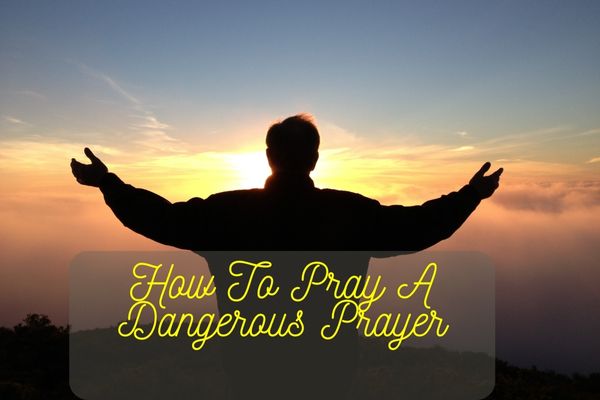Table of Contents Show
Prayer is a fundamental aspect of Christian faith. It is a direct line of communication with God, allowing believers to express their deepest desires, seek guidance, and offer gratitude. While many prayers are comforting and uplifting, there is a subset of prayers known as “dangerous prayers” that challenge believers to step out of their comfort zones and invite God’s transformative power into their lives. These prayers are not for the faint of heart, as they require surrendering control, embracing vulnerability, and trusting in God’s wisdom and perfect plan. In this article, we will explore the concept of dangerous prayers within Christianity and provide guidance on how to pray them effectively.
How To Pray A Dangerous Prayer
Praying dangerous prayers is not about seeking danger for its own sake, but rather about surrendering to God’s leading and trusting in His faithfulness. It is an invitation to step into a deeper relationship with God, experience His transformative power, and participate in His redemptive work in the world. By embracing vulnerability, surrendering control, praying with boldness, and trusting in God’s timing and plan, we can unlock the incredible power of dangerous prayers in our lives. Here are some ways on how to pray a dangerous prayer:
Understanding Dangerous Prayers
Dangerous prayers are those that push believers beyond their perceived limits and propel them into a deeper relationship with God. They are characterized by their boldness, honesty, and willingness to surrender personal desires to God’s will. These prayers often challenge the status quo, disrupt complacency, and invite God to work in powerful and unexpected ways. While they may seem risky, they also hold the potential for profound spiritual growth and transformative experiences.
Embracing Vulnerability
To pray a dangerous prayer, one must be willing to embrace vulnerability. It requires acknowledging our weaknesses, limitations, and doubts before God. It is through vulnerability that we open ourselves up to God’s grace, allowing Him to work in areas of our lives that we may have kept hidden or neglected. Dangerous prayers often involve asking God to reveal our blind spots, convict us of our sins, and lead us on a path of repentance and growth.
Surrendering Control
One of the defining features of dangerous prayers is the act of surrendering control to God. It means letting go of our own agendas, desires, and expectations and allowing God to take the lead. This act of surrender requires trust in God’s wisdom, goodness, and faithfulness. Dangerous prayers may involve asking God to dismantle our comfort zones, break down barriers, and shape us according to His divine purposes.
Praying with Boldness
Dangerous prayers require boldness and audacity. It means approaching the throne of grace with confidence, knowing that God is not only able but also willing to answer our prayers according to His perfect will. It involves stepping out of our comfort zones and praying for things that seem impossible or beyond our reach. Dangerous prayers may involve seeking God’s guidance in making life-altering decisions, asking for opportunities to serve others sacrificially, or praying for the courage to confront injustice and evil in the world.
Trusting God’s Timing and Plan
When we pray dangerous prayers, it is essential to trust in God’s timing and plan. Sometimes, the answers we seek may not come immediately or in the way we expect. God’s ways are higher than ours, and His timing is perfect. Trusting in His sovereignty allows us to surrender our own agendas and patiently wait for His provision and guidance. Even when the journey becomes challenging, dangerous prayers remind us that God is always at work, molding us and shaping us into His image.
Stepping Into the Unknown
Dangerous prayers often involve stepping into the unknown and embracing uncertainty. They require believers to relinquish their need for complete understanding and instead trust in God’s sovereignty and wisdom. These prayers push us to go beyond our comfort zones and rely on God’s guidance, even when the path ahead is unclear. In doing so, we open ourselves up to new opportunities, growth, and a deeper dependence on God.
Praying for God’s Will
At the heart of dangerous prayers is a sincere desire to align our will with God’s will. Instead of praying solely for our own desires and plans, we ask God to reveal His purposes and align our hearts with His. This requires humility and a willingness to let go of personal ambitions that may not be in line with God’s greater plan. Dangerous prayers seek to prioritize God’s kingdom and seek His guidance in every aspect of life.
Embracing the Cost
Dangerous prayers often come with a cost. They may require sacrifice, stepping into uncomfortable situations, or facing opposition. These prayers challenge us to count the cost and be willing to follow God’s leading, even when it means letting go of our own desires or facing hardships. However, it is in embracing the cost that we experience the profound joy and fulfillment that comes from living in alignment with God’s purposes.
Praying for Spiritual Growth
Dangerous prayers are intimately linked to spiritual growth. They invite God to refine us, challenge our character, and shape us into the image of Christ. These prayers may involve asking God to expose areas of pride, selfishness, or unforgiveness within us, and to help us grow in areas of faith, patience, and love. By praying dangerous prayers, we position ourselves to be transformed by God’s grace and become more Christ-like.
Community and Accountability
Praying dangerous prayers can be a daunting task, but it is helpful to have a supportive community of fellow believers who can provide encouragement, accountability, and prayer. Sharing our dangerous prayer requests with trusted individuals who can pray alongside us and offer guidance can help us navigate the challenges and uncertainties that may arise. Additionally, seeking wisdom from spiritual mentors or pastors can provide valuable insights as we pursue dangerous prayers.
Examples of Dangerous Prayers in the Bible
Jabez’s Bold Request
Jabez’s prayer, found in 1 Chronicles 4:10, stands as a testament to the audacity of dangerous prayer. In asking God to bless him indeed and enlarge his territory, Jabez demonstrates a willingness to break free from limitations and trust in the abundance of God. This bold request goes beyond personal comfort, illustrating a profound belief in God’s ability to transform circumstances.
David’s Prayer for God to Search His Heart
Psalm 139:23-24 captures David’s dangerous prayer, asking God to search his heart. In this intimate plea, David showcases the courage to confront his own shortcomings, inviting God to examine every corner of his being. This vulnerable act reflects a desire for alignment with God’s will and a commitment to a life of authenticity.
Paul’s Desire for Spiritual Maturity
Paul’s prayer for the Ephesians, as recorded in Ephesians 3:14-19, exemplifies a powerful and dangerous petition. His request for spiritual strength and rootedness reveals a yearning for a deeper connection with God. This prayer transcends material concerns, focusing on the profound transformation of the inner spiritual landscape.
These biblical examples serve as beacons, guiding us in the art of dangerous prayer—a practice rooted in trust, audacity, and a profound understanding of the limitless nature of God’s grace.
Practical Tips for Safely Engaging in Dangerous Prayer
- Sincere Self-Reflection: Begin by honestly examining your motives and desires. Ensure that your prayers align with personal growth, spiritual development, and a genuine seeking of God’s will.
- Align with God’s Character: Ground your prayers in an understanding of God’s nature. Seek alignment with His character, acknowledging His wisdom, love, and sovereignty in every aspect of your requests.
- Scripture as a Guide: Use the Bible as a guide for framing your prayers. Let the wisdom and promises found in Scripture shape the content and direction of your dangerous prayers.
- Seek Spiritual Guidance: Don’t navigate the journey of dangerous prayer alone. Seek counsel from trusted spiritual mentors or leaders who can provide guidance, insights, and accountability.
- Start Small: Begin with smaller, more manageable requests. Gradually increase the audacity of your prayers as your faith and trust in God’s plan develop.
- Include Praise and Thanksgiving: Infuse your prayers with praise and gratitude. Recognize and appreciate God’s goodness and faithfulness, fostering an atmosphere of humility and acknowledgment.
- Be Open to God’s Timing: Understand that God’s timing may differ from yours. Be patient and willing to wait, trusting that His plans unfold perfectly and in the right season.
- Embrace a Spirit of Surrender: Cultivate a heart of surrender in your prayers. Acknowledge that God’s response may not always align with your expectations, but His wisdom surpasses your understanding.
- Pray with Boldness, Not Demands: Approach dangerous prayers with boldness, not demands. Express your desires fervently but with humility, recognizing God’s authority and wisdom in responding to your requests.
- Maintain a Teachable Spirit: Stay open to the lessons God may unfold through your prayers. Approach the journey with a teachable spirit, ready to learn and grow as you engage in the transformative process of dangerous prayer.
Conclusion
Praying dangerous prayers is not for the faint of heart, but it is an invitation to experience the transformative power of God in our lives. It requires embracing vulnerability, surrendering control, and praying with boldness. Through dangerous prayers, we invite God to work in ways that exceed our expectations, leading us on a path of spiritual growth and alignment with His divine will. So, dare to pray dangerous prayers, trusting that God’s faithfulness will guide you every step of the way.








